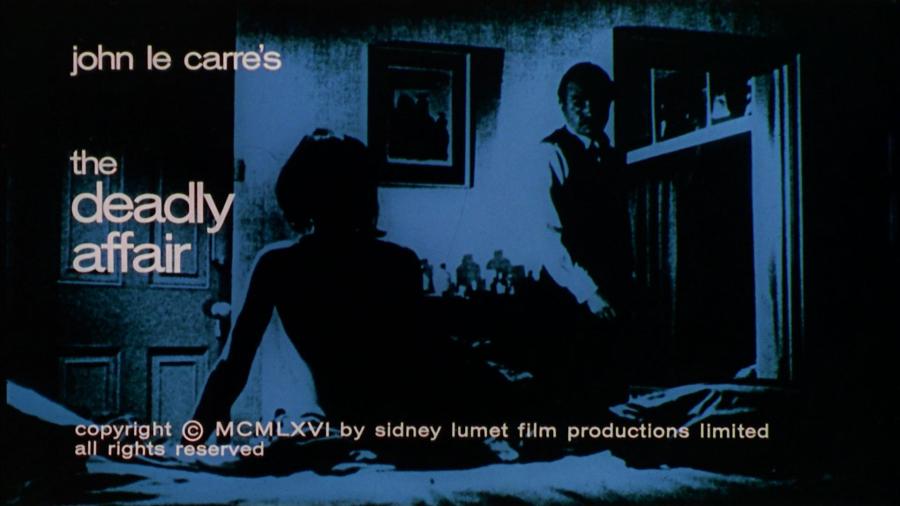“The Deadly Affair” (1967)
Drama

Running Time: 115 minutes
Written by: Paul Dehn
Featuring: James Mason
Charles Dobbs: [to Ann about her nymphomania] “I’ve never held your appetites against you. The unaddicted shouldn’t blame the addicted.”
“The Deadly Affair” is a gripping espionage thriller that keeps viewers on the edge of their seats from start to finish. Directed by Sidney Lumet and released in 1966, this film is a masterclass in tension and intrigue.
At its core, “The Deadly Affair” is a story of betrayal, deceit, and the murky world of espionage. Adapted from John le Carré’s novel “Call for the Dead,” the film follows British intelligence agent Charles Dobbs (played brilliantly by James Mason) as he investigates the apparent suicide of Samuel Fennan, a Foreign Office official with whom he had a professional relationship.
As Dobbs delves deeper into Fennan’s death, he uncovers a web of lies and deception that leads him to question everything he thought he knew. Along the way, he encounters a diverse cast of characters, including Fennan’s widow Elsa (Simone Signoret), who becomes embroiled in the mystery, and his own superiors, whose motives are shrouded in secrecy.
What sets “The Deadly Affair” apart is its emphasis on character development and psychological tension. James Mason delivers a nuanced performance as Dobbs, portraying him as a flawed but determined investigator haunted by his past. Simone Signoret is equally captivating as Elsa, whose motives remain ambiguous until the film’s thrilling climax.
Sidney Lumet’s direction is masterful, creating a palpable sense of paranoia and suspicion that permeates every scene. From the shadowy alleys of London to the corridors of power, the film’s moody atmosphere adds to its sense of foreboding, keeping viewers guessing until the very end.
In addition to its riveting plot and stellar performances, “The Deadly Affair” is also notable for its exploration of moral ambiguity and political intrigue. As Dobbs navigates the treacherous world of espionage, he is forced to confront his own ethics and allegiances, leading to a climax that is as thought-provoking as it is thrilling.
The film’s narrative unfolds with a deliberate pace, allowing viewers to immerse themselves fully in the intricate plot. Every twist and turn is meticulously crafted, keeping audiences engaged and invested in Dobbs’ investigation. As he peels back the layers of deception, the stakes only grow higher, leading to a thrilling climax that delivers both suspense and emotional resonance.
One of the film’s strengths lies in its exploration of the human cost of espionage. Dobbs’ quest for the truth forces him to confront not only external threats but also his own inner demons. His relationships with Elsa and other characters are fraught with tension and ambiguity, reflecting the moral complexities of his profession.
Simone Signoret’s portrayal of Elsa is particularly compelling, as she navigates the murky waters of loyalty and betrayal with a steely resolve. Her interactions with Dobbs are charged with a palpable sense of chemistry and mistrust, adding another layer of depth to the film’s narrative.
Beyond its riveting plot and well-drawn characters, “The Deadly Affair” also boasts impressive technical elements. The film’s cinematography, with its moody lighting and atmospheric compositions, enhances the sense of unease and tension that permeates every scene. Additionally, the score by Quincy Jones perfectly complements the film’s tone, heightening the suspense and drama.
“The Deadly Affair” also merits praise for its portrayal of the political landscape of the time. Set against the backdrop of the Cold War, the film offers a glimpse into the shadowy world of espionage and the ethical dilemmas faced by those caught in its web. The tension between East and West permeates the narrative, adding an extra layer of intrigue to Dobbs’ investigation.
Furthermore, the film’s exploration of power dynamics within the intelligence community is as relevant today as it was when it was first released. As Dobbs navigates the labyrinthine bureaucracy of British intelligence, he must contend with rivalries, betrayals, and shifting alliances, highlighting the precarious nature of his profession.
Moreover, “The Deadly Affair” doesn’t rely solely on action-packed sequences to captivate its audience. Instead, it relies on subtlety and nuance to create a sense of unease and suspense. The film’s dialogue is sharp and incisive, conveying more through what is left unsaid than what is spoken aloud. Every exchange crackles with tension, keeping viewers on the edge of their seats until the very end.
“The Deadly Affair” is a must-watch for fans of espionage thrillers and psychological dramas alike. With its compelling storyline, complex characters, and atmospheric direction, it stands as a timeless classic in the genre.






